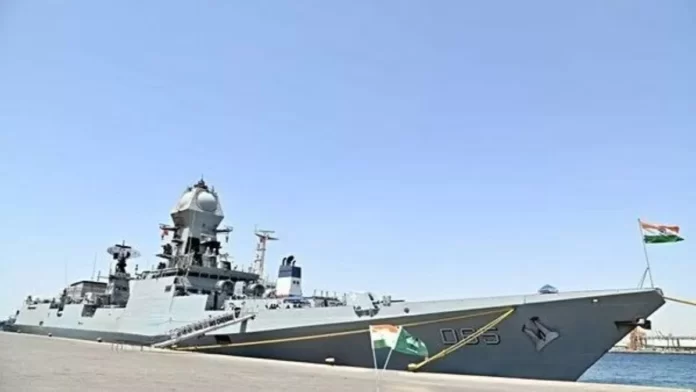In a dramatic turn of events in the treacherous waters of the Gulf of Aden, the Indian Navy showcased its valor and swift action by rescuing a ship under a drone attack. Among the crew of this vessel were 13 Indian nationals whose lives were hanging in the balance as they faced the imminent threat posed by the drones. This daring rescue operation underscores the crucial role played by the Indian Navy in safeguarding maritime interests and ensuring the safety of Indian seafarers amidst volatile maritime environments.
The Gulf of Aden, a strategic waterway connecting the Red Sea to the Indian Ocean, is notorious for piracy and maritime security threats. Commercial vessels passing through this region are often vulnerable to attacks from pirates, insurgents, or other hostile actors. In this perilous maritime landscape, the presence of the Indian Navy serves as a beacon of hope and security for ships navigating these waters.
The recent incident involving a drone attack on a ship in the Gulf of Aden underscores the evolving nature of maritime threats in the 21st century. Drones, once considered a tool of surveillance or reconnaissance, are now increasingly being deployed as weapons of attack by state and non-state actors alike. Their ability to carry out precision strikes from a distance poses a significant challenge to maritime security forces tasked with protecting vulnerable vessels.
Amidst the chaos and danger posed by the drone attack, the Indian Navy sprang into action with remarkable efficiency and courage. Deploying its assets in the region, including warships and aircraft, the Navy swiftly intercepted the hostile drones and neutralized the threat, ensuring the safety of the ship and its crew. The successful outcome of this operation is a testament to the Navy’s professionalism, readiness, and commitment to protecting Indian interests at sea.
At the heart of this rescue operation lies the human element – the 13 Indian nationals onboard the ship whose lives were in jeopardy. As seafarers, they brave the perils of the high seas, often spending months away from their families and loved ones, to support global trade and commerce. Their ordeal serves as a poignant reminder of the sacrifices made by seafarers around the world in the pursuit of their livelihoods.
The swift and decisive action taken by the Indian Navy not only saved the lives of these 13 Indian nationals but also sent a powerful message to the international community about India’s resolve to combat maritime threats and ensure freedom of navigation in critical sea lanes. In an era marked by increasing geopolitical competition and maritime insecurity, such demonstrations of maritime power projection and capability are crucial for safeguarding India’s maritime interests and upholding the rules-based international order.
However, the incident also raises broader questions about the evolving nature of maritime security threats and the need for enhanced cooperation and coordination among regional and international stakeholders. As drones become increasingly ubiquitous and accessible, the challenge of countering drone threats at sea will require innovative solutions and concerted efforts by navies and maritime security agencies worldwide.
Moreover, the incident underscores the importance of robust maritime domain awareness and intelligence-sharing mechanisms to detect and deter potential threats in real-time. As maritime traffic continues to increase in strategic waterways like the Gulf of Aden, proactive measures to enhance maritime security and resilience are essential for safeguarding global commerce and ensuring peace and stability at sea.
In addition, the Indian Navy’s heroic intervention in rescuing a ship from a drone attack in the Gulf of Aden exemplifies the Navy’s commitment to protecting Indian interests and ensuring the safety of seafarers in volatile maritime environments. The successful outcome of this operation highlights the Navy’s professionalism, readiness, and capability in responding to emerging maritime security challenges. As threats at sea evolve and proliferate, navies worldwide must remain vigilant and adaptive to effectively safeguard maritime interests and uphold the rules-based international order.

